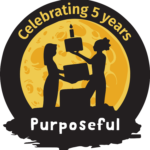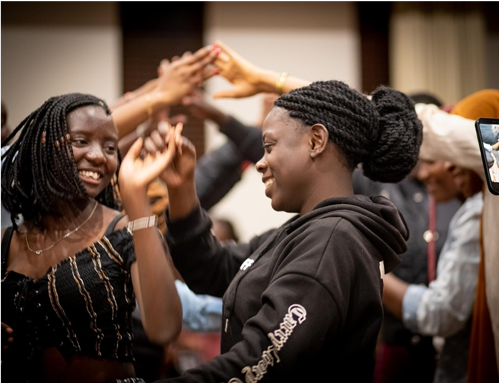Throughout her career as a nonprofit executive, award-winning executive producer and producer/director, broadcast programmer, curator, teacher, and writer, Cara has championed the leadership role of artists in society, and worked to harness the power of cultural...
Leia em portugués | Lea en español
 By Purposeful’s Tana Forrest, Jody Myrum and Emma Mulhern
By Purposeful’s Tana Forrest, Jody Myrum and Emma Mulhern
Edited by Mia Deschamps, IRIS
Many women speak, have spoken, are speaking but are rarely heard … the reality that women are not seen as credible speakers or have no authority to speak their experience is an issue which is immediately implicated in this discussion … it is not solely a question of physical geography, but location or subject position in their wider senses in terms of race, class, gender, sexuality, access, education and so on
What does it mean to tell our own stories? What does it mean to speak out and to be listened to, or to write and to have our words read? When stories are told, whose voices ring the loudest? Who determines which of our stories are amplified … or even valid? These questions are not new, the answers far from simple.
We all have a story to tell, and yet there are countless stories we will never know because they went unheard; were grounded the moment they were shared; or were never shared at all. It is important to consider the implications of having our stories erased in these ways. These erasures are not a coincidence—it is not a mistake that the voices of some ring significantly louder than the voices of others.
We Others stand at the margins of the normative, our voices less audible due to our race, our gender, our class, our religion, our sexual orientation, our ability. Our relationship with or proximity to the normative—and thus, those who hold the most power—determines whether our stories will be heard and if they are, how they will be received. As a result, so many stories—left out of too many history books—remain only with those lucky enough to hear them.
Despite the ways they have been historically silenced or largely ignored, those with some of the most marginalised voices—girls, nonbinary people and young feminists—continue to share their stories in creative, powerful and collective ways. Purposeful, a feminist hub for girls activism, and so many others across the globe recognises the importance of this persistence and are working to acknowledge, document and amplify these stories.
The Circle of Us Fellowship, co-created by the International Resource for Impact and Storytelling (IRIS) and designed and organised by Purposeful, creates a transcontinental space for girls, nonbinary people and young feminists across Sierra Leone, Kenya and Tanzania. Fellows have space to reflect on and share their own stories, and those of others in their communities, as they explore and draw attention to the everyday ways in which they resist, organise and spark change within their contexts. The year-long project equips them with new storytelling skills, including the use of audiovisual equipment for video recording and photography, which they can use to amplify their stories and political organising.
This effort builds on the Stories of Girls’ Resistance, a global feminist storytelling project dedicated to documenting and amplifying the invisible and untold stories of girls, women, and non-binary people’s resistance. This ever growing collection offers glimpses into the resistance, liberatory practices and dreams of a better future held by many girls, women and nonbinary people from 70 countries and counting.
Both efforts use feminist learning principles to gain a better and deeper understanding of what stories are being told and why, how they are being told and by whom, and in light of the historical and ongoing erasure of so many stories, how this process of storytelling may be tracked.

(add image slider)
Applying Feminist Principles to Our Learning
Learning from a feminist perspective means first recognising our positionality—where we are coming from, the power we hold in those places, the various identities that have shaped our perspectives of the world around us, and the ways in which this influences how we approach and interpret the experiences of others.
Not only does it consider dynamics of power, but it recognises the way in which this power produces, is produced by and manifests through inequality. Identifications such as our gender, race, religion, ability, sexual orientation and class intersect and overlap to create our individual experiences of inequality and position us in relation to broader structures of power.
Such structures and dynamics of power have historically determined whose voices are listened to, and the kinds of stories that are deemed relevant, scientific, representative of the “truth”. Equally, they have determined whose voices are silenced, the kinds of stories that are deemed irrelevant, “unscientific” and unworthy of being presented as valid sources of evidence. This history is all the more relevant when considering the African continent and the narratives that have prevailed about African people.
About Objectivity
Feminist scholar Donna Haraway notes that “objectivity” has long been used as a tool of domination by the West. These narratives of objectivity discredit and disregard the power and importance of lived experiences often expressed through storytelling. As we attempt to unravel those narratives, we must also recognise the power we carry—as those seeking to learn from and listen to people’s stories — to perpetuate them. We choose to whom we listen and how, we interpret what we hear in particular ways.
At Purposeful, our learning processes decentre objectivity. We recognise that objectivity is unattainable and our perspectives are always informed by who we are and by our experiences. By taking careful stock of how our listening, learning and interpretations are shaped by the positions we occupy, we resist working towards ideals of “objectivity.”
Questioning our positionality is central to our Learning Agenda and one of the multiple ways in which Purposeful practices feminist monitoring, evaluation and learning (MEL). Other key considerations include:
- being intentional about how we learn from the people we work with;
- not being extractive – learning should not just be about what we can take from participants for the purposes of publication or promotion, but remaining cognisant of how we can learn and reflect together; and
- mobilising our learning politically to challenge dominant narratives about the people we work with, such as the false idea that girls do not participate in political organising.
When determining where and how to focus our learning, we reflect on key questions of meaning and perspective, as well as carefully considering what progress looks like for each project.
- How do we “measure” progress and impact in a way that decolonises these practices?
- How do we avoid perpetuating notions of objectivity and linear pathways of progression that lead towards an end goal, and instead pay attention to the nuances and contextual differences that play a central role in how people respond to and engage with projects such as the Circle of Us?
- How do we create space for participants to determine what is meaningful to them, see impact from their perspectives, share stories they deem worthy of telling?
- What is “progress” when shaped by participants, based on their own experiences, rather than some standardised means of testing or “tracking” towards a predetermined end goal?
Such an approach requires flexibility, being open to change and recognising that while learning goals are important, it is equally important to remain open to learning from the unexpected.
The Trap of More
Another practice to challenge is falling into the trap of more: of doing something because it was planned whether it remains useful or not. Sometimes, we find there isn’t time for another learning exercise or that the activity we had planned feels too long or exhausting at the end of an intense day of thinking, talking, dancing, sharing and listening and all everyone wants to do is rest.
In these moments, sometimes it makes more sense to pause and reflect on why we are pushing for more: why do we need to do just one more exercise or have just one more question answered? Often, we can observe and learn more from the spaciousness, rather than the impulse to fill, capture and tightly orchestrate every moment, towards an empty or false sense of purpose. Where does this pressure come from, and how do we go about unlearning the ways in which we so often centralise it in our work?
Sometimes the learning is in the unlearning; sometimes the learning is in the not doing. Remaining open to discovery, to what we cannot plan, means we create space for the power of stories and truths to emerge and be heard. Imagine how those stories—recorded, amplified, told—could re-shape our world.
